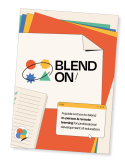In Practice
Supporting Adolescent Girls’ Education (SAGE) programme: the evolution of a blended CPD model | by Plan International
SAGE is funded through the Foreign, Commonwealth and Development Office’s (FCDO) Girls’ Education Challenge initiative. It is a non-formal education programme in Zimbabwe, delivered through a consortium, led by Plan International in partnership with the Ministry of Primary and Secondary Education (MoPSE). Its aim is to help the most educationally marginalised acquire foundational literacy and numeracy skills. SAGE seeks to promote and improve education for girls by tackling the root causes of gendered social and economic barriers, creating an enabling environment for transforming gender norms.
SAGE organises its Community Educators into local learning hubs across 11 districts. Hub-based staff are supported by formal schoolteachers who provide ongoing mentoring and CPD. Prior to the pandemic, the CPD model included face-to-face workshops only.
Covid-19 restrictions led to educational closures. The move to WhatsApp training was a realistic pivot due to reliable mobile phone connectivity. WhatsApp enabled the technical team to continue with CPD as Community Educators adapted to facilitating distance learning and to training new volunteers. The use of WhatsApp allowed for continuous dialogue and increased opportunities for reflective practice.
Initially, WhatsApp training engaged educators through large group work. Feedback from facilitators and Community Educators shaped the approach to move to smaller groups to allow for more in-depth discussions.
The UK Open University (OU) was part of the SAGE technical team to virtually lead WhatsApp training sessions for facilitators. In some instances, CPD sessions for Community Educators were co-facilitated by the technical team to build confidence. All facilitators attended reflective sessions and gave feedback on the approach.
Training materials were succinct, accessible, and compatible with smartphone access. Two-hour WhatsApp workshops for facilitators posed key questions grounded in the case studies. Later, the model moved to smaller group training with sessions focussing on ‘Plan, Do, Feedback, Reflect,’ with staff from hubs across districts working as sustainable geographical communities of practice. As Covid-19 restrictions eased, the training model has become a blended CPD model retaining the benefits.
Share this practice:
In Practice
You can find out more practical use cases here
Subscribe to newsletter

Download our guide for a more in-depth and comprehensive look at developing a successful blended CPD programme.
© Copyright 2023 VVOB - vvob.org